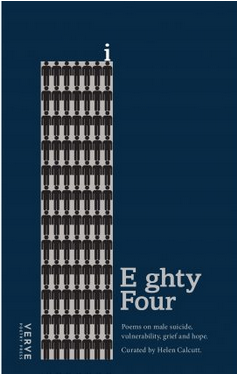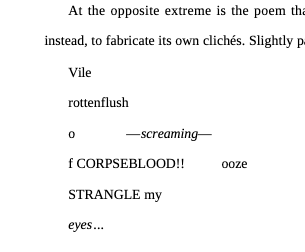 If you love men (or even just one man) or you have an interest in male suicide, male depression, male vulnerability, sacrificial masculinity, toxic masculinity or just good poetry, I really think you should pick up a copy of the poetry anthology Eight Four: Poems on male suicide, vulnerability, grief and hope.
If you love men (or even just one man) or you have an interest in male suicide, male depression, male vulnerability, sacrificial masculinity, toxic masculinity or just good poetry, I really think you should pick up a copy of the poetry anthology Eight Four: Poems on male suicide, vulnerability, grief and hope.
Poet, critic, and university lecturer Helen Calcutt launched and curated the anthology after losing her brother to suicide. Verve Poetry Press published the anthology with proceeds benefiting the Campaign Against Living Miserably (CALM).
Suicide is the biggest killer of men under the age of 45 in the UK. The title of the anthology reflects the staggering statistic that suicide takes 84 men each week in the UK. The causes of suicide are many and varied, and you surely have your own opinions about prevention, but one paragraph from Helen Calcutt’s introduction stuck out for me:
“Women cry, men do not. Men hit women, women don’t hit men. Both examples of what we would consider a socially accepted norm, denies either party their natural complexity. Women do hit men, and though a violent and harmful act, it also highlights a particular type of vulnerability (perhaps a trauma too) that needs addressing. Men weep. It’s probably one of the deepest, moving sounds I have ever heard. Denying this as a normal attribute to male behavior, almost refuses them the bog-standard right to grieve, to shed a skin—to let it out.”
In the end, this is a book about grief but also hope. Many of the poems are from people who have experienced loss to suicide, some from those who experience or at least describe the feelings that lead to suicide, and some are about the possibilities for better lives and better approaches to male vitality.
I don’t want to quote or describe the poems as I think it takes from their power for the reader, but this book is not only for a great cause, it is great poetry. If you love poetry, you are likely to see names you recognise, but you may also be delighted to discover fresh talent. As you would expect, the poems are moving, but never maudlin or overly sentimental.
Like this:
Like Loading...


 If you love men (or even just one man) or you have an interest in male suicide, male depression, male vulnerability, sacrificial masculinity, toxic masculinity or just good poetry, I really think you should pick up a copy of the poetry anthology
If you love men (or even just one man) or you have an interest in male suicide, male depression, male vulnerability, sacrificial masculinity, toxic masculinity or just good poetry, I really think you should pick up a copy of the poetry anthology  The venerable X. J. Kennedy used a poem about “vile rottenflush”
The venerable X. J. Kennedy used a poem about “vile rottenflush”




 On our first meeting, she
On our first meeting, she